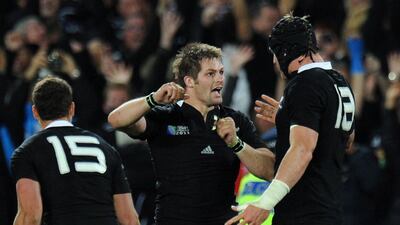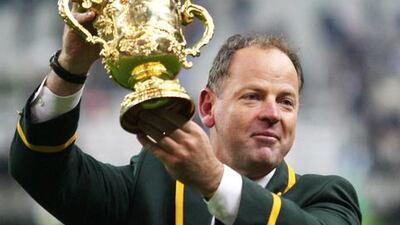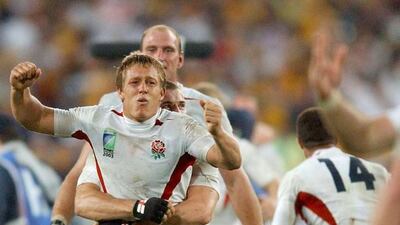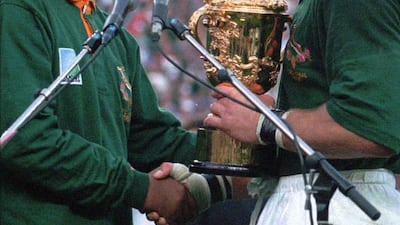With the 2015 Rugby World Cup fast approaching, Steve Luckings looks back on the seven previous winners of the tournament.
1987
Held: New Zealand
Winners: New Zealand
The All Blacks won the inaugural competition on home soil as what was then an amateur sport proved it could be a commercial success. Legends of that bygone era, including Sean Fitzpatrick, John Kirwan, Grant Fox and the incomparable Michael Jones, were imperious. New Zealand topped their pool with huge victories over Italy, Fiji and Argentina before overwhelming Scotland 30-3 in the first knockout match. Another massive score – 49-6 – was inflicted on Wales before, fittingly, Jones, David Kirk and Kirwan crossed the whitewash in the final against France in a 29-9 win at Eden Park.
1991
Held: England, France, Ireland, Scotland, Wales
Winners: Australia
The man England love to hate lit up the tournament as David Campese stamped his mark as a bona fide superstar of the international game. The Wallabies emerged top of a group containing Western Samoa, Wales and Argentina but it was the quarter-final against Ireland at Lansdowne Road that really caught the attention. Pundits often talk about players having the “X-factor” without explaining really what it is. If any player had it, Campese did: his no-look-over-the-shoulder-pass to Tim Horan to set-up Michael Lynagh’s last-ditch try was a moment of magic. The winger scored two tires in that game and one in the semi-final to knock New Zealand out. England were the final opponents, in which a dull, 12-6, game was settled as much by Lynagh’s kicking as England’s abandoning of their forwards-dominated approach that had carried them through to the championship game for a more expansive passing game.
1995
Held: South Africa
Winners: South Africa
The first major sporting event to be held in South Africa following the end of apartheid, the hosts were not expected to end the tournament in possession of the Webb Ellis trophy, especially when, in the final, they were faced with the most awesome specimen to ever pick up the oval ball. Jonah Lomu, a raw, 20-year-old winger that looked like he could just as easily slot in next to Ian Jones in the second row, announced his arrival on the world stage with bulldozing tries over Ireland (2) and Scotland before he literally ran over the England defence to help himself to four tries in the semi-final. The final, at Ellis Park, was seen as a mere coronation of the new king of rugby. But South Africa, with the sort of performance right off the shelf marked “fairy tales” cut the bullocking back down to size, with Japie Mulder, a man half Lomu’s size, the Springboks’ tackler-in-chief. In a tense final, fly-halves Joel Stransky and Andrew Methens exchanged three penalties and a drop goal each to take the game to extra time before the former sent home a sweetly-struck half-volley to send the home fans into delirium. What happened after the match has become a seminal moment in the history of the sport. Nelson Mandela, wearing a Springboks shirt – so often a symbol of black oppression and white supremacy in the country – presented the trophy to the Springboks captain Francois Pienaar. The “Rainbow Nation” was born.
1999
Held: Wales, England, Scotland, France, Ireland
Winners: Australia
A tournament largely remembered for three things. The first: South Africa’s Jannie de Beer’s clinical display of kicking a ball on the half-volley as he sent over an unprecedented five drop goals from all areas of the pitch to kick England out at the quarter-final stage. Secondly, New Zealand’s “chokers” tag gaining more traction as the pre-tournament favourites were unceremoniously dumped out of the competition by a France team that clicked at the exact right time and, third, for Tim Horan’s subtlety and sublime skill with the ball in hand as Australia swept to their second World Cup trophy. De Beer’s wasn’t the only masterclass in kicking: Matthew Burke’s eight penalties in the semi-final against South Africa is a joint-tournament record, and Stephen Larkham’s drop goal in that 27-21 extra-time victory was colossal. If anything, France peaked in their semi-final win over the All Blacks as tries from Ben Tune and Owen Finegan and the precision kicking of Burke saw Australia run out victors 35-12 at the final in Cardiff’s Millennium Stadium.
2003
Held: Australia
Winners: England
Clive Woodward's England flew halfway across the world with a squad containing several players with 50 caps or more and the likes of Neil Back, Richard Hill, Lawrence Dallaglio, Jonny Wilkinson, Mike Tindall and Will Greenwood all undisputed as masters of their positions. While they struggled through the group stages or, at least, did not dominate as expected, the return to fitness of Hill, a flanker of the world-class variety, coincided with an upturn in form as England saw off the threat of Wales thanks to a Greenwood try, setting up a semi-final showdown against France. As soon as the England players saw the forecast for the match at Telstra Stadium in Sydney was for rain, and that Freddie Michalak was pencilled in at fly-half for Les Bleus, the game was as good as one. Wilkinson bombarded the talented, but far-from-comfortable in the conditions, and even less so under the high ball, Michalak and kicked England into the final courtesy of five penalties and four drop goals. The final against Australia was a real barnburner: Lote Tuqiri gave the Wallabies a lead; outjumping Jason Robinson to touch down in the corner before, the England wing finished off a flowing move in the corner for a five-pointer of his own. Wilkinson and Elton Flatley exchanged penalties to send the match into extra time. Wilkinson sealed the trophy with that drop goal for a 20-17 win.
2007
Held: France, Scotland, Wales
Winners: South Africa
A tournament for the underdog, in many respects. An anomaly in this tournament saw Argentina defeat France in the opening match 17-12, and then went on to beat them 34-10 in the third place play-off, while South Africa beat England 36-0 in the group stages, and went on to play them in the Paris final, winning 15-6. Although England were defending champions and could hardly be labelled “underdogs”, Brian Ashton’s side had lost several prominent members of the squad that had carried them to victory in Australia four years earlier, most notably captain Martin Johnson. There defence of the Webb Ellis cup could not have got off to a much worse start, becoming the first defending champions in World Cup history to be “niled” in that heavy defeat to the Springboks. That setback, however, was a catalyst for an upwards turn in form and fortune for England, and they eventually secured a place in the final through narrow victories over Australia and France in the knockout stages. Although the final was a much tighter affair, a booming 50-metre penalty from Francois Steyn and a Mark Cueto try that was ruled out by the television match official saw South Africa claim the trophy a second time. Os du Randt, arguably the greatest prop to play the game and who played the whole 80 minutes of the final, became the sixth player to win the World Cup a second time.
2011
Held: New Zealand
Winners: New Zealand
Cast aside and casting a fishing line as his mates attempted to win a World Cup on home soil for a second time, the last thing Stephen Donald expected in the autumn of 2011 while on a fishing holiday was a phone call from Graham Henry asking him to come to the aid of the All Blacks who were devoid of three first-choice fly-halves. The first to drop was Dan Carter, who suffered a partial tear of his left adductor groin muscle, ruling him out of the tournament in the group stages. Colin Slade stepped up to resume playmaker duties, but he too succumbed to injury after just 33 minutes of action in the quarter-final win over Argentina. Third-choice Aaron Cruden started the final at Eden Park against France, where the hosts had taken an early lead through a Tony Woodcock try, but when he too had to be withdrawn injured it was left to Donald, who had been left out of Henry’s original World Cup squad and should have been linking up with his Bath teammates in England, to slot over what proved to be a winning penalty in an 8-7 win.
sluckings@thenational.ae
Follow us on Twitter @NatSportUAE





